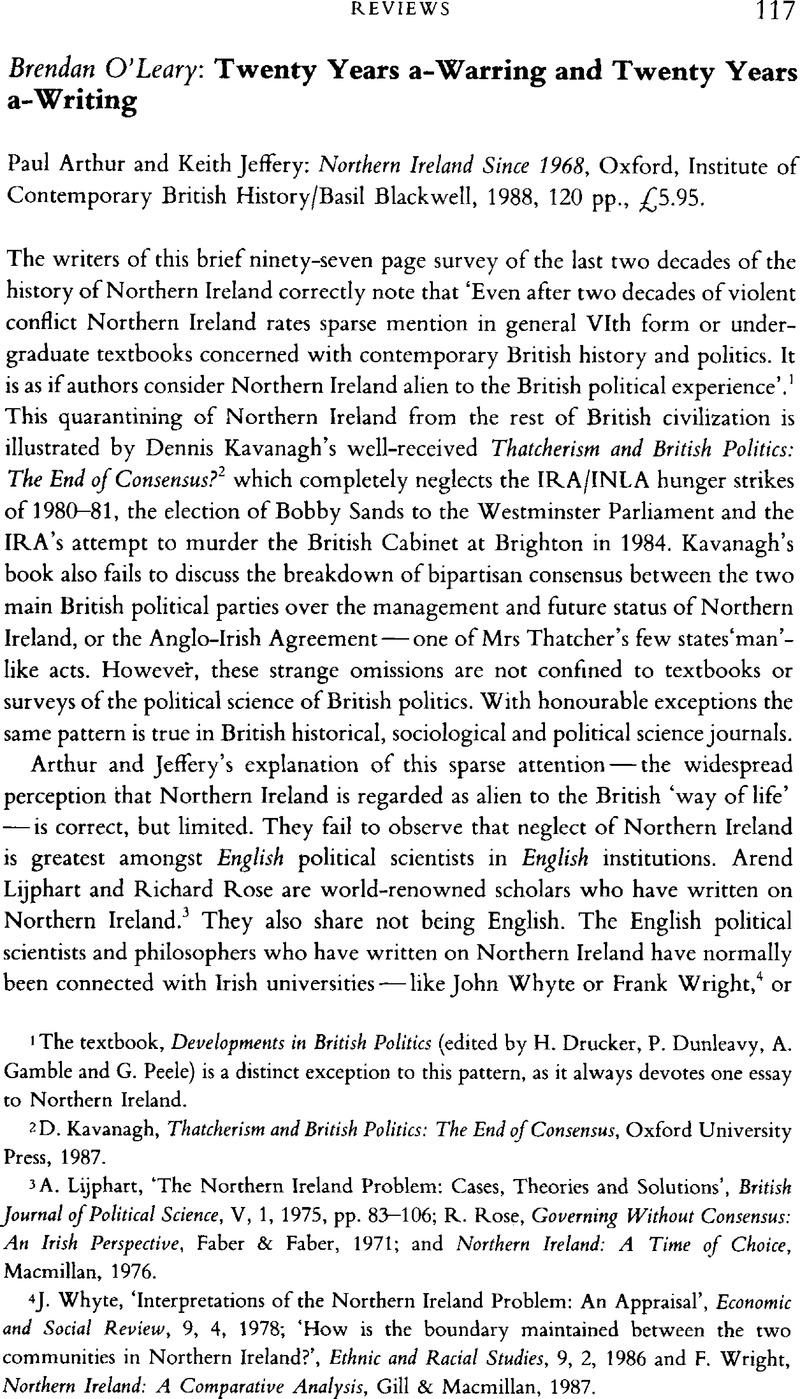No CrossRef data available.
Published online by Cambridge University Press: 28 March 2014

1 The textbook, Developments in British Politics (edited by H. Drucker, P. Dunleavy, A. Gamble and G. Peele) is a distinct exception to this pattern, as it always devotes one essay to Northern Ireland.
2 Kavanagh, D., Thatcherism and British Politics: The End of Consensus, Oxford University Press, 1987.Google Scholar
3 Lijphart, A., ‘The Northern Ireland Problem: Cases, Theories and Solutions’, British Journal of Political Science, V, 1, 1975, pp. 83–106;CrossRefGoogle Scholar Rose, R., Governing Without Consensus: An Irish Perspective, Faber & Faber, 1971 Google Scholar Northern Ireland: A Time of Choice, Macmillan, 1976.Google Scholar
4 Whyte, , ‘Interpretations of the Northern Ireland Problem: An Appraisal’, Economic and Social Review, 9, 4, 1978; ‘How is the boundary maintained between the two communities in Northern Ireland?’, Ethnic and Racial Studies, 9, 2, 1986Google Scholar and Wright, F.J., Northern Ireland: A Comparative Analysis, Gill & Macmillan, 1987.Google Scholar
5 Kenny, A., The Road to Hillshorough, Pergamon Press, 1986.Google Scholar
6 See my Review Article in the British Journal of Criminology, 28, 1: pp. 97–107, 1988.
7 A recent depressing example of this trait, compounded by unthinking racist characterization of the Irish, was Anthony Burgess’s review of Michael Holroyd’s biography of George Bernard Shaw (Guardian, 16 September 1988). Burgess completely misinterpreted Shaw’s John Bull’s Other Island, and praised Shaw’s ‘very un-Irish logicality’. Such failures of comprehension, arrogance and racism are all too common amongst English intellectuals in their discussions of the Irish. I have lost count of the number of times intelligent English people have sincerely told me that I am a ‘bright Irishman’ — as if this pair of words was a surprising paradox.
8 See especially Whyte, John, Is Research on the Northern Ireland Problem Worthwhile? Inaugural Lecture, The Queen’s University Belfast, 1983 and Rupert Taylor, ‘Social Scientific Research on the “Troubles” in Northern Ireland: The Problem of Objectivity’, The Economic and Social Review, 19, 2, 1988, pp. 123–45.Google Scholar
9 Arthur, , The Government and Politics of Northern Ireland, Longman, second edition, 1984.Google Scholar
10 See inter alia Lijphart, A.P., Democracy in Plural Societies: A Comparative Exploration, New Haven, Yale University Press, 1977 Google Scholar and Nordlinger, E., Conflict Regulation in Divided Societies, Centre for International Affairs, Cambridge, Mass., Harvard University 1972.Google Scholar
11 See inter alia Gellner, E., Nations and Nationalism, Basil Blackwell, 1983.Google Scholar
12 Lustick, I., State-Building Failure in British Ireland and French Algeria, Berkeley, Institute of International Studies, 1985.Google Scholar Lustick’s recently published For the Land and the Lord: Jewish Fundamentalism in Israel, New York Council on Foreign Relations, is also relevant for comparative analysts.